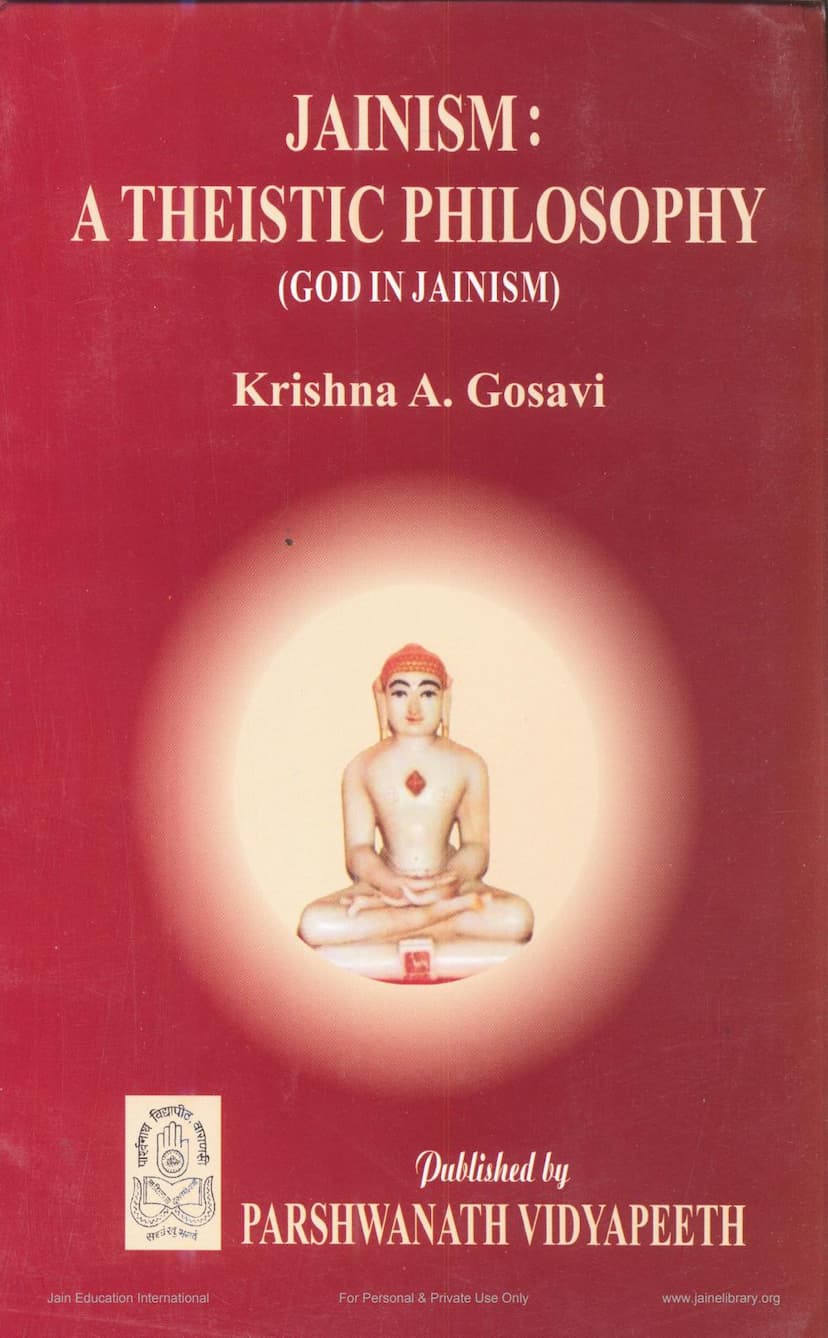Jainism A Theistic Philosophy
Added to library: September 2, 2025

Summary
Here's a comprehensive summary of the Jain text "Jainism: A Theistic Philosophy" by Krishna A. Gosavi, based on the provided pages:
Central Argument: The book's primary aim is to establish Jainism as a theistic philosophy and religion, challenging the prevailing notion, particularly in Western academia, that it is atheistic or heterodox. The author argues that this classification is misleading and unjustified, especially when comparing Jainism to other global religions.
Jainism's Concept of God:
- Rejection of Creator God: Jainism does not believe in a creator, sustainer, or destroyer God in the way that many other Indian philosophical systems (like those derived from Vedic traditions) do. The universe, for Jainas, is considered eternal and self-governing, not requiring an external creator.
- Paramātmā as God: Contrary to the belief in a creator deity, Jainism posits the existence of Paramātmā (Supreme Soul) as God. Paramātmā represents the highest spiritual state achievable by any soul.
- Godhood as an Attainable State: The author emphasizes that in Jainism, any soul has the potential to evolve and attain the state of Paramātmā (Godhood) through spiritual purification and self-effort, even within this very lifetime. This is achieved by freeing oneself from all karmas (actions and their material consequences).
- The Paramātmā's Attributes: The Paramātmā (God) is characterized by infinite vision, infinite knowledge, infinite bliss, and infinite power. These are seen as the soul's inherent qualities, which become manifest upon liberation from karmic impurities.
- Arhats and Siddhas as Gods: The perfected souls, known as Arhats (embodied perfected souls) and Siddhas (disembodied perfected souls), are considered the Gods of the Jains. They have attained omniscience and are free from all karmic bondage. Tirthankaras, who are rare souls capable of revealing and preaching the spiritual path, are also deified.
Critique of Traditional Classifications:
- Āstika vs. Nāstika: The author strongly refutes the traditional Indian classification of philosophical schools into Āstika (orthodox, accepting Vedic authority) and Nāstika (heterodox, rejecting Vedic authority). The book argues that this classification, often mistakenly translated as theist vs. atheist, is misleading because many Āstika schools (like Sāṁkhya and Pūrva Mīmāṁsā) do not believe in a creator God, while the Nāstika Jainism is profoundly theistic in its own right.
- Western Misinterpretations: Western scholars, due to a superficial understanding and often a focus on the absence of a creator God, erroneously labeled Jainism as atheistic. They were also unaware of the Jain concept of the soul's potential to achieve Godhood.
- Misconceptions about Mahāvīra and Founders: The book also addresses misconceptions about Jainism's founder, clarifying that Jainism is an ancient, eternal religion with Rishabhanatha as the first Tirthankara, not founded by Mahāvīra or Pārśvanātha.
Key Jain Concepts Discussed:
- Soul (Jīva): The existence of the soul is proven through self-experience and introspection. The soul is described as eternal, conscious, and distinct from non-soul (ajīva).
- Karma: Karma is understood as subtle material particles that adhere to the soul, influencing its experiences and transmigration. The science of karma is central to Jain spirituality, and freedom from karma is the path to liberation. The author details the types of karma and their functioning.
- Transmigration (Rebirth): Rebirth is a direct corollary of the doctrine of karma. The soul, bound by karma, transmigrates through various life forms across different realms (human, animal, celestial, infernal).
- Stages of Spiritual Development (Guṇasthānas): The book outlines the fourteen stages of spiritual progress that a soul undertakes on its journey toward liberation, culminating in the state of Paramātmā.
- Theism vs. Atheism: The author defines theism in both Western (belief in a creator God) and Indian (acceptance of Vedic authority, or belief in a higher spiritual reality) contexts, arguing that Jainism aligns with a broader, more spiritual understanding of theism found in Indian thought. It emphasizes self-effort and inner realization rather than divine grace.
- Comparison with Other Philosophies: The book extensively compares Jain views on the soul, God, karma, and liberation with those of Vedic philosophy (including Upaniṣads, Bhagavad Gita), Vedanta (especially Advaita Vedanta of Shankara), Buddhism, Sāṁkhya, Yoga, and Nyāya-Vaiśeșika. These comparisons highlight Jainism's unique positions, such as the soul's body-bound size and the material nature of karma, while also identifying similarities in the pursuit of liberation.
Overall Message: The book argues that Jainism, with its emphasis on the soul's potential divinity, the doctrine of karma, and the worship of perfected souls as Paramātmā, is fundamentally a theistic religion. It seeks to correct historical misinterpretations and present Jainism as a complete and rational spiritual philosophy that offers a unique path to liberation through self-effort and ethical conduct. The author concludes that modern scholars need to adopt an unbiased approach to understand the depth and nuances of Jainism's theistic perspective.